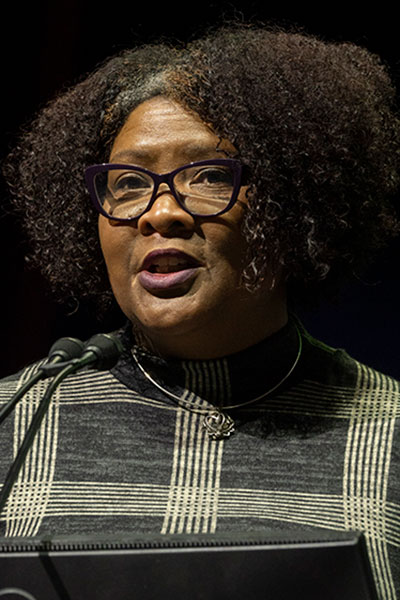To overcome disparities in breast cancer outcomes, research must move beyond traditional understandings and definitions, Melissa B. Davis, PhD, said during the Plenary Lecture on Thursday, December 12, at the 2024 San Antonio Breast Cancer Symposium®.

Dr. Davis, Director of the Institute of Translational Genomic Medicine at Morehouse School of Medicine, outlined the need to investigate complex and evolving factors during her lecture, The Grand Challenge of Unraveling Social vs. Biological Drivers of Racial Disparities in Cancer Outcomes. The session will be available on demand for registered 2024 SABCS® participants until March 31, 2025.
Socioeconomic status has historically been considered a primary driver for disparities in outcomes for Black women with breast cancer, Dr. Davis noted. However, in the United States, it has become clear that outcomes have not improved with increased affluence. For example, in Atlanta, the top 1% and 2% of earners in the African American population are 126% more likely to die of breast cancer, Dr. Davis said. Therefore, understanding tumor characteristics is essential for improving outcomes.
“Tumor characteristics actually play a very significant role in racial disparities in breast cancer,” Dr. Davis said. “The most obvious [area] to start is with hormone receptor status [because], in the United States, we know that triple-negative breast cancer is more than twice as likely to be diagnosed in Black patients.”
More recent research has shown that treatments such as endocrine-targeted therapies, which immediately had substantial impact on outcomes in white patients, did not achieve the same outcomes in Black patients nearly a decade later, Dr. Davis said. This suggests that the effectiveness of treatments may vary based on genetic factors such as ancestry.
If a genome-wide association study lacks representative enrollment, it creates bias that calls into question the accuracy of the clinical tools and knowledge derived from that study. Overcoming these limitations requires not only the creation of diverse cohorts but also the inclusion of researchers from diverse backgrounds.
In addition, isolating risk-associated and outcome-associated markers may enhance the understanding of ancestry’s influence on breast cancer subtypes. For example, Dr. Davis noted that West African ancestry has been associated with a higher likelihood of triple-negative breast cancer.
“So as we scan West African ancestry in local ancestry studies, what we should find in triple-negative patients is a spike that represents this shared ancestry background, which then allows us to home in [on] what is yet still an unknown allele that provides this predisposition,” she said.
The creation of SAMBAI
Dr. Davis also shared her work with the SAMBAI (Social, Ancestry, Molecular, and Biological Analysis of Inequalities) study group, which aims to address disparities in populations of African ancestry, with a focus on the African diaspora. The global team, led by Dr. Davis, was established through a $25 million grant funded by Cancer Research UK and the National Cancer Institute as part of the Cancer Grand Challenges global research initiative. The group was the first Cancer Grand Challenge awardee to focus on cancer inequities, and it marked the first grant awarded to an investigator at a historically Black medical school.
SAMBAI incorporates an oversampling of African ancestry in a target population of 40,000 enrollees across Africa, the United Kingdom, and the United States, Dr. Davis said, with the goal of identifying genetic factors that may contribute to health inequities.
The team will take a multidisciplinary approach to address cancer inequities, with a focus on breast, prostate, and pancreatic cancers. The strategy involves five distinct but interrelated work packages that will look at reframing social and societal determinants of health; identifying environmental exposures; investigating gene expression and tumor biology; analyzing immune response; and developing patient-centered dissemination practices.
“We hope that this [study’s work] will also allow us to fully appreciate how, in the circle of precision medicine, geography, [and] ancestry, the lived experience — not just socioeconomic status — will be a reflection of the diversity that’s necessary to truly create the precision medicine that’s necessary to overcome inequities,” Dr. Davis said.
Access the 2024 SABCS® virtual platform
Watch any sessions you’ve missed and stay connected with fellow attendees in the online platform of the 2024 San Antonio Breast Cancer Symposium®. Recordings of sessions will be available on demand for registered 2024 SABCS® participants until March 31, 2025.

